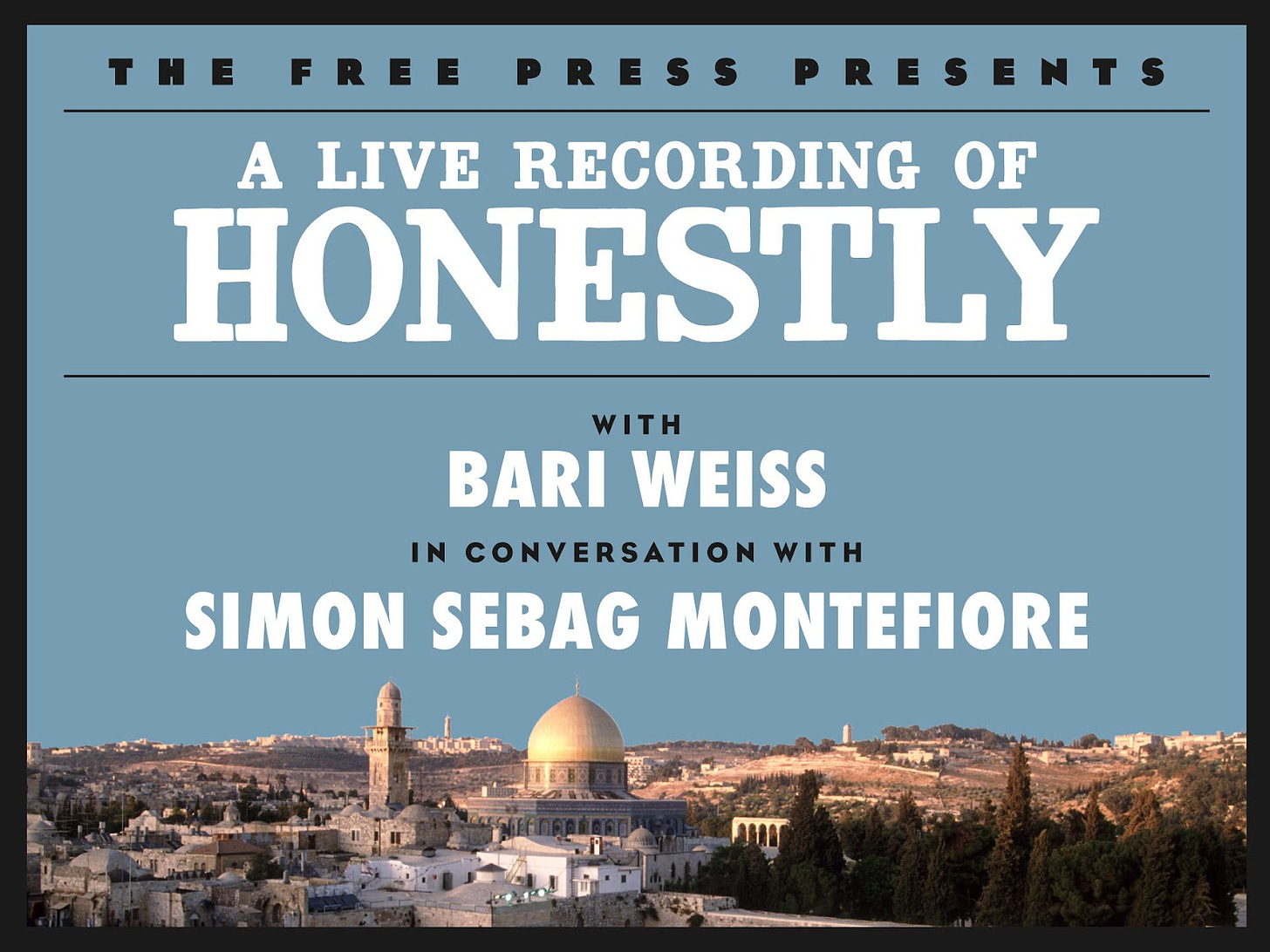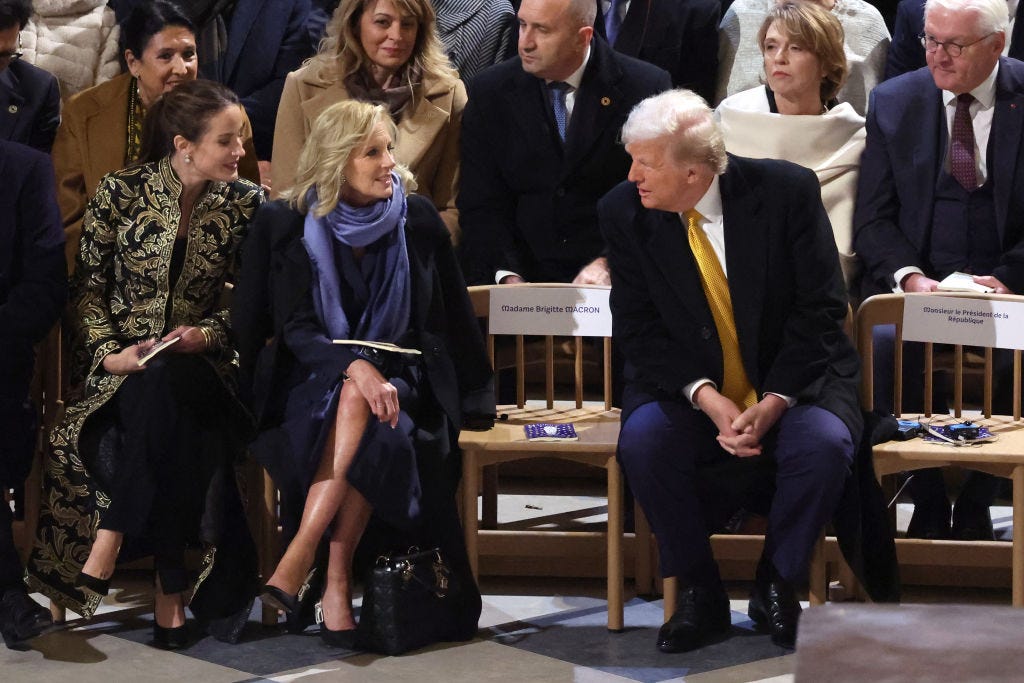It’s Monday, December 9. This is The Front Page, your daily window into the world of The Free Press—and our take on the world at large. Coming up: why preemptive pardons are a bad idea, letters to the editor, our next live event, and more.
But first: the fall of Assad.
A despotic dynasty came to a dramatic end over the weekend, when Bashar al-Assad fled Syria, reportedly for Moscow. It is, as foreign correspondent par excellence Dexter Filkins put it in a Free Press Q & A yesterday, “a pivotal event in the history of the modern Middle East.”
The regional ramifications are huge. As Dexter explained in his exchange with my colleague Adam Rubenstein, with Assad’s fall, “the Iranian project lies in ruins.” It’s a loss for Vladimir Putin, too. Assad has gone from being one of Moscow’s most important allies to its newest resident. And a bad weekend for the self-styled “Axis of Resistance” is a good weekend. Period.
Nevertheless, there’s plenty of reason to fear what might come next. Among them: Abu Mohammad al-Jolani, the former al-Qaeda militant who leads the dominant rebel group Hayat Tahrir al-Sham (HTS) and now rules Damascus. Al-Jolani says his hard-line Islamist days are behind him. CNN has described his journey “from radical jihadist to a blazer-wearing ‘revolutionary’.” Let’s see about that. You hardly need to be a cynic to doubt that a beautiful multiethnic, multi-faith Syrian democracy is about to blossom, like a rose in the desert (to borrow the headline of maybe the most regrettable article in the history of Vogue). Less cheery possible outcomes include repressive Islamist rule, feuding warlords, and the disintegration of the state of Syria.
Western powers are evidently hoping for the best while planning for the worst. In recent days, Israel has conducted air strikes against military sites linked to Assad’s chemical weapons and ballistic missile programs. IDF troops have moved into Syrian territory in a step Benjamin Netanyahu characterized as a “temporary defensive position.” And the United States struck ISIS camps in Syria on Sunday.
And yet how can the images out of Syria not spark some optimism? Ordinary people toppling statues and dancing in the streets, political prisoners—including, impossibly, a toddler—liberated from Assad’s notorious prisons. A tyrant’s palace ransacked. An evil man sent packing.
“It is impossible to watch the fall of the brutal tyranny of the House of Assad without feeling joy,” writes the historian Simon Sebag Montefiore in our lead story today. “But this is the Middle East,” he continues. “Anyone who remembers the Arab Spring knows that things can always get worse. And anyone who studies history knows that predictions are for fools.”
To really understand what just happened—and what might happen next—Simon argues that you need to go back further than the start of the Syrian civil war, or the start of the Assad family’s blood-soaked half-century in power.
Book Now: A Live Recording of Honestly with Simon Sebag Montefiore
We’re thrilled to announce that—as well as writing this insightful piece on Syria for us—Simon Sebag Montefiore will appear alongside Bari at an in-person Free Press event in New York next month. Bari and Simon will discuss Jerusalem for a live recording of Honestly. Simon recently updated his brilliant “biography” of the city for a new edition—and events in the Middle East make this conversation about a city that has endured so much as timely as ever.
Join Simon and Bari on the evening of Wednesday, January 22, at the Streicker Center in New York City. For more information and to reserve your tickets before they sell out, click here.
Preemptive Pardons Are a Terrible Idea
In the final days of the Biden administration, some of the president’s closest advisers are debating whether he should issue preemptive pardons for Democrats and other public figures against whom Trump has threatened retribution. Blanket pardons like this would be an extraordinary, unprecedented step. And a mistake, argues Eli Lake. Far from protecting public life from our downward spiral of lawfare, Eli thinks it’d be the latest example of one side using the other’s bad behavior as an excuse for their own breach of important norms. And that, he writes, is how republics unravel.
Read Eli Lake’s full take on the problem with preemptive pardons.
And for more on presidential pardons, watch Batya Ungar-Sargon’s latest Free Press Live monologue:
Letters to the Editor
We tackle some weighty issues on our letters page this week. “I’ve watched someone I love die,” explains one reader, as he makes the case for legalized assisted suicide. Another reader responds to Charles Fain Lehman’s recent report on the fight to legalize psychedelics. And a third argues that, by learning how to kill and butcher the meat she eats, Free Press writer Larissa Phillips has more in common with vegans than she realizes.
And if you have a unique perspective on a Free Press story, why not write a letter of your own? Drop us a line at letters@thefp.com.
“I Need You to Protect Me”
Gazelle Sharmahd’s father Jamshid was born in Iran, raised in Germany, and lived in America for twenty years. He used his expertise as a software engineer to help Iranian dissidents and opposition figures circumvent the regime’s repression. And for that, he became an enemy of the mullahs. In 2009, the regime sent assassins to the United States to kill him. The plot was foiled by the FBI. Then, in 2020, he was kidnapped in Dubai and taken back to Iran, where he was imprisoned on trumped-up terrorism charges. This October, Jamshid—a German Iranian dual citizen and a longtime U.S. resident—was executed.
In this Free Press video, we hear from Gazelle Sharmahd about her father, and what the media gets wrong about the regime that killed him. Watch her interview below:
Notre Dame reopened Saturday, five years after a fire destroyed its roof—and came close to destroying the whole cathedral. The great and the good were in attendance for the ceremony to reopen the spiritual heart of Paris, which was a master class in French pageantry. My favorite moment? The Archbishop of Paris “awakening” the cathedral’s organ after half a decade of silence.
The ceremony was also a return to the world stage for Donald Trump, who you just know wasn’t going to miss a show like this. And European leaders didn’t miss the opportunity to grab some face time with the last and next leader of the free world. And he seemed to have a great time. He ordered a Coke (regular) from Emmanuel Macron. He told Prince William he was doing a “fantastic” job. And, more importantly, he reportedly had a constructive conversation with Volodymyr Zelensky. Also in attendance: Jill Biden, who was snapped in some friendly-looking pictures with Trump. (Trump later used one photograph to sell his new line of perfumes and colognes, “Fight, Fight, Fight.”)
Joe Biden said that he believes that Austin Tice, the American journalist who went missing in Syria in 2012, is alive. “We will want to get him out,” said Biden at a press briefing at the White House Sunday. “We have to identify where he is.” Tice’s family said they had fresh evidence that he is alive, but on Friday expressed their frustration with the Biden administration’s handling of Austin’s case.
Donald Trump said he would not fire Federal Reserve Chair Jerome Powell before the end of his term. “No, I don’t think so. I don’t see it,” said Trump on Sunday’s Meet the Press. Powell’s term is up in 2026 and last month, he told reporters that it is “not permitted under the law” for the president to fire him, and that he would not step down if Trump asked him to. Trump appointed Powell to the post in 2017, and frequently applied public pressure to him regarding interest rate decisions in 2018 and 2019.
The University of Michigan will no longer ask for diversity statements when considering candidates for hiring, promotion, and tenure, according to an official statement. This announcement arrived last week on the heels of a New York Times investigation that revealed the Big Ten school spent more than a quarter-billion dollars on diversity, equity, and inclusion over a 10-year period—more than half of which went to salaries for DEI staff.
Nearly half of Harvard students mentioned race in their college application essays, according to a survey of Harvard’s first freshman class since the Supreme Court ruled against race-based admissions. And one in four students said they felt pressure to mention race in their applications. We sympathize with these students and their race anxiety, though it surely is not as punishing as the pressure to humbly admit they “went to college in Boston.”
Oliver Wiseman is a writer and editor at The Free Press. Follow him on X @ollywiseman.

 By The Free Press | Created at 2024-12-09 11:06:18 | Updated at 2024-12-24 16:14:29
2 weeks ago
By The Free Press | Created at 2024-12-09 11:06:18 | Updated at 2024-12-24 16:14:29
2 weeks ago















